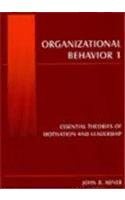
Organizational Behavior I: Essential Theories Of Motivation And Leadership PDF
Preview Organizational Behavior I: Essential Theories Of Motivation And Leadership
ABOUT THE AUTHOR John B. Miner has a professional practice in Eugene, Oregon. He held the Donald S. Carmichael chair in human resources at the State University of New York–Buffalo and was faculty director of the Center for Entrepreneurial Leadership there. Previously he was Research Professor of Management at Georgia State University. He has written over fifty books and over 135 other publications. Copyright © 2005 by M.E. Sharpe, Inc. All rights reserved. No part of this book may be reproduced in any form without written permission from the publisher, M.E. Sharpe, Inc., 80 Business Park Drive, Armonk, New York 10504. Library of Congress Cataloging-in-Publication Data Miner, John B. Organizational behavior I. Essential theories of motivation and leadership / by John B. Miner. p. cm. Includes bibliographical references and index. ISBN 0-7656-1523-1 (cloth : alk. paper) 1. Employee motivation. 2. Leadership. 3. Organizational behavior. I. Title: Organizational behavior one. Essential theories of motivation and leadership. II. Title: Organizational behavior. 1, Essential theories of motivation and leadership. III. Title: Essential theories of motivation and leadership. IV. Title. HF5549.5.M63M5638 2005 302.3'5—dc22 2005003746 Printed in the United States of America The paper used in this publication meets the minimum requirements of American National Standard for Information Sciences Permanence of Paper for Printed Library Materials, ANSI Z 39.48-1984. ~ BM (c) 10 9 8 7 6 5 4 3 2 1 DEDICATION To the intellectual leaders who coined the ideas and much of the research that made this book possible: J. Stacy Adams Gary P. Latham Bernard M. Bass Edward E. Lawler Fred E. Fiedler Kurt Lewin George B. Graen Edwin A. Locke Stephen G. Green Robert G. Lord J. Richard Hackman Fred Luthans W. Clay Hamner David C. McClelland Frederick Herzberg Terence R. Mitchell Robert J. House Greg R. Oldham Arthur G. Jago Lyman W. Porter Steven Kerr Victor H. Vroom Robert Kreitner Philip W. Yetton and the many who worked with them. CONTENTS List of Tables and Figures ix Preface xi Acknowledgments xv PART I. SCIENTIFIC INTRODUCTION Chapter 1. Science and Its Theory 3 Chapter 2. The Conduct of Research and the Development of Knowledge 18 PART II. THEORIES OF MOTIVATION Chapter 3. From Social Psychology and Personality Theory: Kurt Lewin 37 Chapter 4. Achievement Motivation Theory: David McClelland 46 Chapter 5. Motivation-Hygiene Theory: Frederick Herzberg 61 Chapter 6. Job Characteristics Theory: Richard Hackman, Edward Lawler, and Greg Oldham 75 Chapter 7. Expectancy Theories: Victor Vroom, and Lyman Porter and Edward Lawler 94 Chapter 8. Operant Behavior and Organizational Behavior Modification: Clay Hamner, and Fred Luthans and Robert Kreitner 114 Chapter 9. Equity Theory: J. Stacy Adams 134 Chapter 10. Goal-setting Theory: Edwin Locke and Gary Latham 159 Chapter 11. Attribution Theory—Managerial Perceptions of the Poor Performing Subordinate: Terence Mitchell and Stephen Green 184 PART III. THEORIES OF LEADERSHIP Chapter 12. Normative Decision Process Theory: Victor Vroom, Philip Yetton, and Arthur Jago 207 Chapter 13. Contingency Theory of Leadership: Fred Fiedler 232 Chapter 14. Vertical Dyad Linkage and Leader–Member Exchange Theory: George Graen 256 Chapter 15. Information Processing Theory of Leadership: Robert Lord 280 Chapter 16. Substitutes for Leadership: Steven Kerr 300 Chapter 17. Role Motivation Theory: John Miner 319 Chapter 18. Charismatic Leadership Theory: Robert House 337 Chapter 19. Transformational Leadership Theory: Bernard Bass 361 Name Index 387 Subject Index 400 vii LIST OF TABLES AND FIGURES TABLES 3.1 Methods Used to Create Leadership Climates 40 4.1 Development of the Power Motive and Managerial Performance 51 4.2 Relationships Between Socialized Power and Promotion Among Non-technical Managers 56 5.1 Pre- and Post-Measures of Job Satisfaction for Job Enrichment Projects 68 6.1 Correlation Between Motivating Potential Score and Outcome Variables Moderated by Growth Need Strength and Context Satisfactions 86 7.1 Percentage of Those with Various Instrumental Perceptions Who Are High Performers 102 7.2 Multiple Correlations for Seven Outcomes of Effort–Reward Probabilities Alone and in Combination with Value of Reward (Valence) as Predictors of Job Effort and Performance 104 8.1 Strategies for Shaping and Modeling 121 9.1 Possible Inputs to and Outcomes from an Employment Exchange 136 9.2 The Amount of Inequity Experienced Under Various Input and Outcome Conditions 137 9.3 Errors Detected per Page and Number of Pages Proofed Under Varying Conditions of Equity 142 11.1 Managerial Attributions Regarding Poor Group and Individual Performance Hypothesized from Theory at Link #1 of the Attributional Model 192 11.2 Significant Correlations Between Attributions for Performance and Corrective Actions Recommended 197 12.1 Feasible Sets of Leader Behaviors for Each of Fourteen Group Problem Types 212 12.2 Correlations Between Aspects of the Problem Situation and the Degree of Participativeness of the Reported Leader Behavior 218 12.3 Validity Evidence from Six Studies Representing Normative Tests 220 13.1 Fiedler’s Early Classification of Interactive Task Groups 236 13.2 Contingency Theory Variables, Level of Analysis, Measures Used, and Sources of Data 242 14.1 Normative Model for the Development of Dyadic Career Realities 260 14.2 Relationships Between LMX and Outcome Variables 268 14.3 The Development of Dansereau’s Dyadic Approach to Leadership 272 15.1 Comparison and Evaluation of Information Processing Models 284 15.2 Potential Means That Can Be Used by Executives to Influence Organizational Performance 288 16.1 Neutralization Effects of Substitutes for Leadership on Two Types of Leader Behavior 303 16.2 Effects of Various Organizational Characteristics on Members’ Task-relevant Information and Motivation in Mechanistic and Organic Organizations 305 ix
